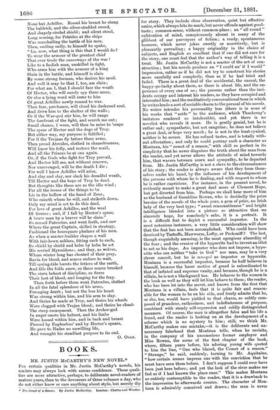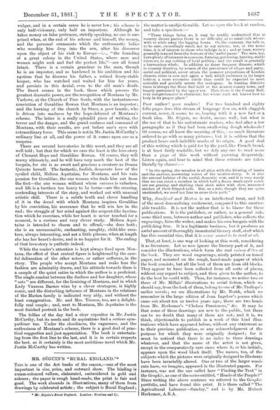BOOKS.
MR. JUSTIN McCARI 'S NEW NOVEL.*
FOR certain qualities in Mr. Justin McCarthy's novels, his readers may always look with serene confidence. These quali- ties are more attractive, perhaps, to deliberate novel-readers of mature years, than to the devourers of three volumes a day, who do not either know or care anything about style, but merely dip • The Omit of a Season. By Justin McCarthy. London: Matto and Windt's. for story. They include close observation, quiet but effective satire, which always hits its mark, but never offends against good- taste ; common-sense, without common-place ; an " all round " cultivation of mind, conspicuously absent in many of the glibbest of our purveyors of fiction ; a ready, spontaneous humour, which never jokes overtly or assertively, but is pleasantly pervading ; a happy originality in the choice of subjects, and English so excellent that if one did not care for the story, one must feel that the author's way of telling it is a treat. Mr. Justin McCarthy is not a master of the art of con- struction ; but his novels produce an " I could an' if I would " impression, rather as if he did not try to construct his stories more carefully and complexly, than as if he had tried and failed. There is a great deal of the accidental, the casual, the happy-go-lucky about them, as there is about life, and the ex- perience of every one of us ; the persons rather than the inci- dents occupy and interest his readers, as they have occupied and interested him ; and the meditatively conversational tone in which he writes lends a sort of sociable charm to the perusal of his novels. No writer intrudes his personality less (there is in none of his works that " aside " to the audience, which Thackeray's imitators rendered so intolerable), and yet there is no novelist who reveals it more. He is gently genial, but he is rather sad ; sympathetic, but not sanguine ; he does not believe a great deal, or hope very much ; he is not in the least cynical, neither is he severe. He has refined tastes, and is totally with- out affectation ; and only be could portray such a character as Montana, his " comet of a season," with skill so perfect in its simplicity that he never disguises the truth about the man from the reader, and yet never allows the attitude of mind towards him, that wavers between scorn and sympathy, to be departed from. Mr. Justin McCarthy is not a slave to the circumstances of his story ; the reader is always aware that they form them- selves under his hand, by the influence of his development of the persons with whom he is dealing, and with respect to whom he is rather capricious. For instance, in the present novel, he evidently meant to make a great deal more of Clement Hope, but got diverted from him. Perhaps we shall hear more of him as the husband of Geraldine Rowan, who is decidedly the prize heroine of the novels of the whole year, a gem of price, an Irish lady of the very best type; "sweet reasonableness " and bright intelligence blended into a picture so attractive that we sincerely hope, for somebody's sake, it is a portrait. It is a difficult feat to depict a successful impostor. In the most notorious instances, a very little consideration will show that the feat has not been accomplished. Who could have been deceived by Tartuffe, Mawworm, Lofty, or Pecksniff ? The last, though exquisitely amusing, is the most egregious absurdity of the four ; and the creator of the hypocrite had to invent an idiot to act as his dupe. An impostor who does not impose, a hypo- crite who can neither " take in God " nor man, may be a very clever conceit, but he is manque as impostor or hypocrite. Montana is a successful impostor, because he half believes in himself, because the baser motive of greed is subordinated to that of inflated and supreme vanity, and because, though he is a villain, he is not a blackguard too. He behaves to the women in the book as well as they will let him behave to them ; the reader, who has been let into the secret, and knows from the first that Montana is a villain, feels that it is quite fair and reason- able for the women to be on his side, and freely admits that he, or she, too, would have yielded to that charm, so subtly com- posed of grandeur, enthusiasm, and indefiniteness of purpose, combined with steady self-repression and coldly distinguished manners. Of course, the man is altogether false and his life a fraud, and the reader is looking on at the development of a scheme which is no mystery to him ; still, we think Mr. McCarthy makes one mistake,—it is the deliberate and un- necessary falsehood that Montana tells, when he revisits, in the company of his unconscious former employer and Miss Rowan, the scene of the first chapter of the book, where, fifteen years before, his adoring young wife quoted to him the line, " One who blazed, the Comet of a season." " Strange," he said, suddenly, turning to Mr. Aquitaine, "how certain scenes impress one with the conviction that he must have seen them before. I don't suppose I could ever have been just here before ; and yet the look of the river makes me feel as if I had known the place once." This makes Montana so entirely contemptible to the reader, that it is a drawback to the impression he afterwards creates. The character of Mon- tana is admirably conceived and drawn ; the man is never
vulgar, and in a certain sense he is never low ; his scheme is only half-visionary, only half an imposture. Although he takes money on false pretences, strictly speaking, no one is sur- prised when, at the end of his scheme and himself, the money, and the personal ornaments which the enthusiastic ladies who worship him drop into the urn, after his discourse upon the object of his visit to Europe—i.e., "the founding of a great colony in the United States, where men and women might seek and find the perfect life,"—are all found intact. There is a certain grandeur in the man, though he is an impostor, and so hardened in his ambition and his egotism that he disowns his father, a retired livery-stable keeper, who has watched and waited for him for years, and persists in this denial, even to the old man's death.
The finest scenes in the book, those which possess the greatest dramatic power, are the recognition of Montana by Mr. Varlowe, at the Church of Free Souls, with the instantaneous conviction of Geraldine Rowan that Montana is an impostor ; and the burning of the church by Starr, a poor fanatic, who is driven into madness by the hope-deferred of Montana's scheme. The latter is a really splendid piece of writing, the terror and the danger, and the grand coolness and command of Montana, with their results, are put before one's eyes with extraordinary force. This scene is not in Mr. Justin McCarthy's ordinary line at all, and the power of it comes upon one as a surprise.
There are several love-stories in this novel, and they are all well told ; but that for which we care the least is the love-story of Clement Hope and Geraldine Rowan. Of course, they will marry ultimately, and he will have very much the best of the bargain, for she is as sweet and gracious a creature as Donna Quixote herself. The fantastic, foolish, desperate love of the spoiled child, Melissa Aquitaine, for Montana, and his vain passion for Geraldine, the one woman who finds him out from the first—the one woman without whom success is valueless, and life is a burthen too heavy to be borne—are the crossing, contending interests of the story, and worked out with unusual artistic skill. There is a subtle truth and clever handling of it in the dread with which Montana inspires Geraldine by his conviction, his assurance that he will win her in the end; the struggle of her mind against the serpent-like fascina- tion which he exercises, while her heart is never touched for a moment, is a curious and very clever study. Melissa Aqui- taine is intended to charm and to offend,—she does both ; she is an unreasonable, enchanting, naughty, child-like crea- ture, always interesting, and not a little piteous, when at length she has her heart's desire, and is no happier for it. The ending of that love-story is pathetic indeed.
While the reader's attention is kept always fixed upon Mon- tana, the effect of that central figure is heightened by the care- ful delineation of the other actors, or rather sufferers, in the story. The people who accept Montana and make him the fashion are admirably drawn, and his attitude towards them is a sample of the quiet satire in which the author is a proficient.
The single combat between the duchess and her daughter, whose " sets " are different, for the lionizing of Montana, and in which Lady Vanessa Barnes wins by a clever stratagem, is highly comic, and the disturbing influence of Montana in the relations of the Marion family is indicated very ably, and without the least exaggeration. Mr. and Mrs. Trescoe, too, are a delight- fully real couple ; and, next to Montana, Mr. Aquitaine is the most finished portrait in the book.
The follies of the day find a clear expositor in Mr. Justin McCarthy, but its needs and its aspirations find a serious sym- pathiser too. Under the cloudiness, the vagueness, and the enthusiasm of Montana's scheme, there is a good deal of prac- tical suggestion and just appreciation. The book is entertain- ing from the first line to the last, and it is in certain respects the best, as it certainly is the most ambitions novel which Mr. Justin McCarthy has written.







































 Previous page
Previous page